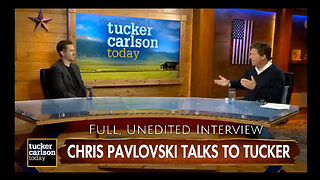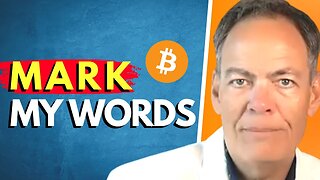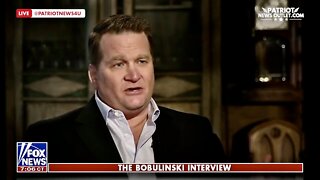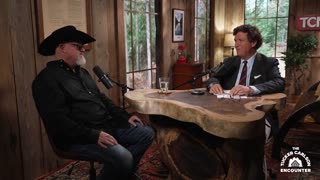The Tucker Carlson Interview: Pavel Durov, owner of Telegream - first interview in 9 years
The social media app Telegram has over 900 million users around the world. Its founder Pavel Durov sat down with us at his offices in Dubai for his first on-camera interview in almost a decade.
READ THE TRANSCRIPT
Tucker [00:00:00] Telegram is one of the fastest growing and biggest social messaging apps text apps in the world popular all around the world, including in the United States. But almost nothing or very little seems to be known about the company. It's headquartered in Dubai, where we are now. It is run and owned in. The software is design, written by Pavel Durov, who began it some years ago, who almost never does interviews. It turns out he's in a very interesting person, an extremely interesting person. We learned that the other day we were talking to him, and he has agreed to sit down and tell us about himself and his company, and we thought it'd be definitely worth hearing. And with that, thank you for joining us.
Pavel Durov [00:00:40] Well, thank you for having me.
Tucker [00:00:42] So, I confess, I used telegram. I didn't know anything about you or the company, and I was just kind of amazed by your story. And if you wouldn't mind just recreating it a little bit, for our audience. Where are you from? How do you start this and why?
Pavel Durov [00:00:57] That will be a long story. That's okay. I was born in 1984, in the Soviet Union. So it was a funny year to be born in. And, back then, I could witness, you know, the deficiencies of the centralized system we had in the Soviet Union. When I was four years old, my family moved to Italy, where I could compare what I saw in Turin, Italy, with, what I experienced in the Soviet Union. And I thought the capitalist system, the free market system is definitely better, at least for me. And I went to school in Italy. I, became sort of a part of the, European as a result. But then when the Soviet Union collapsed, we decided to move back to Russia. In Italy, though, we, me and my brother, we had a lot of fun time. He was, shown live on Italian TV as a young prodigy kid who could solve cubic equations in real time, being just, you know, 30 years old. And that was considered to be impossible back then in Italy.
Tucker [00:02:09] I don't know what a cubic equation is. So, yeah, it was difficult.
Pavel Durov [00:02:13] Definitely. And, you know, when I first went to school in Italy, I didn't know how to speak Italian. I didn't know a single Italian word. And a lot of teachers said this guy, well, this kid will not going to be successful in our school by the end of the first year was second best by the end of this, next year I was the best student in our class. So it also showed me that, well, you could excel, you could compete. I like that competitive environment. And then the when we got back to Russia, it was a little bit chaotic. The only reason we got back is my father got, an offer to run. One of the departments in the Saint Petersburg State University is one of the, famous scholars and writers, dealing with ancient Roman literature. And, that experience was very different. And, I still enjoyed it because in Russia in the 90s, you had this experimental schools where, you were. Taught everything like we had six foreign languages. We had math, like very special.
Tucker [00:03:21] Six foreign languages at once.
Pavel Durov [00:03:22] Six foreign languages. In parallel. You would have math similar that you would have in specialized math schools. And like chemistry at the same level you would have at schools specialized in chemistry and biology. So that was really intense. My brother, he became world champion in maths in International Olympiads, in maths and programing many times in a row. Absolute best myself. I was just the best student in my school. Also did some victories in, local competitions in several areas, but we both were very passionate about coding and, designing stuff. And because we brought this IBM, PC computer from Italy back in the early 90s, we were one of the few families in Russia who could actually, teach ourselves how to program. And, we started to do that. I was, in the university. I was building websites for my fellow students. And, as a result, you know, I started, a company that became what they called the Facebook of Russia. We don't like to name it that way because, we actually managed to do a lot of things before Facebook. And that defined how the social media, industry developed in the years to come. The company's name was VK. I started it when I was 21 years old. I just graduated university, and, it eventually became the largest social network, the most popular social network in Russia, Ukraine, Belorussia, Kazakhstan, and a bunch of other post-Soviet countries. That was a significant effort on my side because I, at a certain point, was the sole employee of the company. I would write the code myself. I would do the design myself. I would, manage the servers myself. It was quite intense. I even, responded to customer support requests, rarely slept. But that was, a fun time when I was 21, 22 years old. And then the company grew, like I said, to somewhere about 100 million active users, which was a lot back that it's, was, I think 2000, 12 or 2011 when we faced this, the first issues in, Russia. Because, you see, I was still a big believer in this values of free market freedoms, freedom of speech, freedom of assembly. So when the Russian opposition started to use VK to organize large protests in Russia, where like almost half a million people would go and protest on the main square or some of the main squares of the city, we were requested to ban this communities on VK by the government and I refused.
Tucker [00:06:37] So the government asked you to shut down communications between their opponents?
Pavel Durov [00:06:43] Well, VK is a social networking platform, so they have this large public communities that anybody can join. Anybody can read what people are discussing or what the administrators are posting. They can comment, they can share. So it was a tool for this protesters to organize themselves. They were led by Navalny. It's quite a famous person now. And back then it wasn't about us, you know, siding with one side with one part of the, political, fight or the other. It was us defending the freedom of speech and the freedom of assembly, which we believed was the right thing. But that didn't go too well with with the government. And, they were not too happy about that, I would say. And, in a few years from then, in 2013, we had a similar situation where, you know, you had this protests in Ukraine where people, again, would use VK to organize themselves and go to the main square of the city and, show their disagreement with the government.
Tucker [00:07:54] Yes.
Pavel Durov [00:07:55] And we received a request demand from the Russian side saying, you have to give us the private data of the organizers of this protest. And our response was, wait, wait a minute. This is a different country. Well, we won't betray you. Corinthian users because you ask us to do that. We decided to refuse. And, that didn't go too well with the Russian government as well. So at the end of that year, I had to make a. Difficult decision because I was offered basically a choice between two suboptimal, options, one of which was, I would start complying to whatever the leaders of the country told me to do. The other one was, I could. So my stake in the company retire, resign as the CEO and leave the country. I chose the latter.
Tucker [00:09:00] That's a it's a if I can ask you to pause. It's a little strange because I have heard people say that telegram is a part of the Russian government, and you're describing the opposite. You're saying you had to leave the country because you wouldn't bow to their demands.
Pavel Durov [00:09:15] Well, exactly like you say. And people who have very limited knowledge of where telegram came from, they would make these claims. They could be encouraged by our competitors who see it as an easy way to discredit us because, you know, telegram was spreading like forest fire. 2.5 million users sign up every day, and we're sort of a threat. So I'm not surprised there's this perception because our competitors, they spent tens of billions on marketing, and they're known for using PR firms to also engage in campaigns like that. So how would.
Tucker [00:09:54] You how much do you spend on marketing?
Pavel Durov [00:09:56] Zero.
Tucker [00:09:57] $0 in dollars?
Pavel Durov [00:09:59] $0. We've never spent anything on acquiring users for marketing purposes. We never promoted telegram. You know, on other social platforms in any way. This is very different from. Other apps. You could see them being promoted here or there. Pilgrim is different. All of our growth is purely organic. And, we got to almost 900 million users, without, having to spend anything on ads to promote Tillable.
Tucker [00:10:37] Amazing. I'm sorry to interrupt you. No, no, it's just it's just interesting because I have heard people say that, but it sounds like the opposite of the truth. So you decided to sell the company, resign as CEO and leave your country?
Pavel Durov [00:10:50] Yes, that's what I did. It was a bit painful because obviously my first company was my baby. I created myself. There was a lot of creativity, time and effort invested in that platform. But at the same time, you know, I understood that I would rather be free. I would want to take orders from anyone. And, I left behind probably a comfortable life. But for me, it was never about, you know, becoming rich. For me, everything in my life was about becoming free. Yes. And to the extent it is possible, my mission in life was to allow other people to also become free, in a sense, and using the platforms that we created where I created, my hope was that they could express their freedom. This is the mission of telegram. And it was also, in part, the mission of my previous company, VK.
Tucker [00:11:53] So you start telegram after you leave Russia. Correct?
Pavel Durov [00:11:57] Yeah. So the idea for telegram came when we were still based in Russia, because at some point we had this, very stressful situation where armed policemen would come to my house, try to break in because I refused to take down this, opposition groups that I mentioned earlier. And I realized there is no secure means of communication. I realized through, I want to tell my brother what's going on, to coordinate whatever we want to do. And the every tool to communicate I could use was not really secure or not encrypted. It was not safe to use them. So I thought it could be a good idea to actually come up with, do a decently encrypted messaging app. And my brother, being the genius that he is, he was able to create this encryption standard that we're using up until this day with minor changes. But the idea came.
Tucker [00:13:02] Brother wrote the encryption.
Pavel Durov [00:13:03] Yes. Well, my brother like two pages and maths. Super smart. He could. You know, he's an expert in cryptography. He designed, the basic principles of the Telegram's encryption. Was more on the user interface side. The way how the app works, the features, etc.. He was responsible for it for the encryption side.
Tucker [00:13:30] So where did you go when you left Russia?
Pavel Durov [00:13:33] We tried several places. We first went to Berlin. We tried to set up a company in Berlin. We then tried London, Singapore, San Francisco, you name it. We've been everywhere.
Tucker [00:13:46] And why didn't you stay in any of those places?
Pavel Durov [00:13:50] Oh, because the bureaucratic hurdles were just too difficult to overcome. Now, I was bringing the best in class programmers in the world to this places, and I was trying to hire them. From a local company. And the response I got in places like Germany, for example, is that, no, no, no, you can't hire people from outside of the European Union because you should first run some newspaper ad in a local, magazine or whatever. And then for six months, nobody responds from the engineers that are available inside the European Union and Germany. Then you're allowed to hire outsiders. And I thought it was a crazy idea, because.
Tucker [00:14:39] Why didn't you just say they were illiterate refugees?
Pavel Durov [00:14:43] Well, because we didn't consider ourselves risky. We were, you know, very successful people. We could have. Gone anywhere.
Tucker [00:14:51] Know, but if you told them you were illiterate refugees, they would let you stay. Yeah. So you wait. So you go from Germany to Singapore to London to San Francisco. What happened in San Francisco.
Pavel Durov [00:15:05] On San Francisco? We. Really thought that would be the place for us to be in, because all the tech companies are, of course, here or around San Francisco. And, there are two things that happened that, made us, think twice. Well, one thing is pretty obvious. I was in San Francisco. I got attacked on the street after visiting, I think it was Jack Dorsey, in Twitter in the Twitter's office. And, I was walking back at 8 p.m., to my hotel, and I got attacked in the street. This is the only country where I got attacked on the street. What happened is just three big guys tried to grab my phone from my hands. I was tweeting, about the fact that I just met, the founder of Twitter. That seemed right. Like a right idea for me back then, to do. And, I get attacked. I didn't want to let them have my phone. They probably didn't expect, resistance. So I smashed my phone back. There was a short fight with the guys. There was a little bit of blood involved, but I managed to run away, and decided I should probably.
Tucker [00:16:25] They probably don't mug a lot of Russians. They might have been surprised.
Pavel Durov [00:16:29] Well, there were much taller than me, I must admit. And there are three of them. But, I think I put up a good fight.
Tucker [00:16:36] Were you surprised that this happened in San Francisco? Completely. Yeah.
Pavel Durov [00:16:40] It was. It was a shock to me because I traveled a lot. There was the first, place I got attacked, and I thought, all right, maybe we shouldn't, look at San Francisco. Maybe there are other places in America where.
Tucker [00:16:56] Where you don't get attacked.
Pavel Durov [00:16:57] Yeah, exactly. But, you know, there's this second part, which was probably more alarming there in the US. We get too much attention from, you know, the the FBI, the security agencies, wherever we came to the US. So to give you an example, last time I was in the US, I brought, an engineer that is working for telegram, and there was an attempt to secretly hire my engineer behind my back by cyber security officers or agents, where they.
Tucker [00:17:34] I called the US government to hire your engineer.
Pavel Durov [00:17:37] That's my understanding. That's what he told me.
Tucker [00:17:39] To write code for them or to break into telegram.
Pavel Durov [00:17:43] They were curious to learn which open source libraries are integrated to the telegram app. You know, on the client side. And they were trying to persuade him to use certain open source tools that he would then integrate into the telegram code that, in my understanding, would serve as backdoors.
Tucker [00:18:06] Would allow the US government to spy on people who use telegram.
Pavel Durov [00:18:10] The US government, or maybe any other government, because a backdoor is a backdoor regardless of who is using it. That's right.
Tucker [00:18:18] And you're that's a little surprising to hear. Maybe it's not surprising. It's offensive. You're confident that happened?
Pavel Durov [00:18:26] Yes. There is no reason for my engineer to make up the stories. Also, because I personally experienced similar pressure in the U.S whenever I would go to the U.S, I would have, two FBI agents greeting me at the airport asking questions. One time I was having my breakfast at 9 a.m. and the FBI showed up at my house that I was renting. And, that was quite surprising. And I thought, you know, we're getting too much attention here. It's probably not the best environment to run.
Tucker [00:19:06] Why would they? Have you committed a crime?
Pavel Durov [00:19:08] No. They were interested to learn more about telegram. They knew I, you know, left Russia. They knew what we were doing, but they wanted details. And my understanding is that they wanted to establish a relationship. So could you in a ways, control telegram better? I'm. I understand they were doing their job. It's just that for us, running a privacy focused social media platform, that probably wasn't the best environment to be in. We want to be focused on what we do, not on the government relations of that sort.
Tucker [00:19:47] The government relations. So then you came to UAE, to Dubai?
Pavel Durov [00:19:53] Yes. Seven years ago we, moved here. We first wanted just to try it, for half a year, see if it works out. And it turned out to be a great place. We never looked. Back, and we never wanted to change the UI for any other place after that.
Tucker [00:20:13] Why?
Pavel Durov [00:20:15] Well, for a number of reasons. First, the ease of doing business here is, so high. For example, you can hire people from anywhere in the world as long as you're paying them a good salary. The residence permits granted automatically. It's very different if you try to do that in Europe. In some other countries, it's very different from them. Second, it's very tax efficient. Third, the infrastructure is great. You get a lot for, the minimum amount of taxes you're paying. The other the, the roads, the airports, the hotels, everything. I think you witnessed it yourself. Yes. But I think more importantly is that it's a neutral place. It's a neutral country. It's a small country that wants to be friends with friends with everybody. It's not aligned geopolitically with, any of the big, superpowers. And I think it's, the best place for a neutral platform like ours to be in. If we want to make sure we can defend our users privacy and freedom of speech.
Tucker [00:21:20] So in the time that you've been here, there have been a number of wars and threats of war. Precursors to war. Have you had any pressure from the government here? Honestly, any pressure from the government here, to reveal a back door into telegram or to ban anyone or to make any changes to your business? Zero.
Pavel Durov [00:21:42] That's the best part. For all the seven years we've been here, there's been zero pressure coming from the UAE towards Telenor. They've been very supportive, very helpful and it's a big contrast from whatever we've experienced before.
Tucker [00:21:59] What about what you've experienced since you moved here in those seven years? Have you come under pressure from other governments under whose jurisdiction you don't follow but to to accommodate their demands?
Pavel Durov [00:22:11] Well. Of course. Well, telegram is a is a large platform. We are popular in many, many countries. And. We've we've, been, receiving a lot of requests. Demands? Some of them were legitimate. Legitimate? It's, there was a group of people was promoting violence. There was some terrorist activity that was, you know, spreading violence in some parts of the world publicly, posting, things that, any decent human being would disallow or wouldn't want to be posted would help them, or in some other cases where we thought who would be crossing the line? It wouldn't be, you know, we'd align with our values of freedom of speech and, protecting people's private correspondence. We would ignore.
Tucker [00:23:07] Those. Can you give us an example of a request that you thought crossed into censorship and and spying, violating people's privacy? Well.
Pavel Durov [00:23:17] This is a, I would say, very funny story related to your home country. After the events of January the 6th, we received a letter from, I believe, Congressman. Yeah, of the Democratic side. And, they requested that we would share all the data we had in relation to what they called this uprising. And we checked it with our lawyers, and they said, you better ignore it. But the letter seemed very serious. And, the letter said, you know, if you are fail to comply with this request, you will be in violation with, you know, the US Constitution or something.
Tucker [00:24:08] So they wanted data on people who voted for the other guy in the election.
Pavel Durov [00:24:12] But they wanted the data of people who were demonstrating in Washington or wherever you doing? They're probably right there. I'm not an expert in these politics. Yeah. What, what's funny about that is two years. Exactly two weeks after that, we got another letter, a new letter from the Republican side of, the Congress. And there we read that if we give out any data according to the previous request, we would be in violation of the US Constitution. So we got two letters that said, whatever we do, we be violating the US Constitution in a way. That was my understanding of this letter's.
Tucker [00:25:07] From the same legislative body, both from the US Congress. Yes. So how do you respond to that?
Pavel Durov [00:25:13] Well. The same way we respond to most such requests, we decided to ignore them because it's such a complicated matter related to internal politics in the US. We don't want to take any.
Tucker [00:25:28] If you would. I believe this strongly. If you ignore your problems, most of them do go away.
Pavel Durov [00:25:33] That's very true.
Tucker [00:25:34] It is. It is very. No, it says it, but it's true. Oh. That's amazing. Have you ever had demands that you can't ignore?
Pavel Durov [00:25:43] Well. It depends. Right.
Tucker [00:25:45] Unreasonable demands.
Pavel Durov [00:25:46] So I would say the largest pressure towards telegram is not coming from governments. It's coming from Apple and Google. So when it comes to freedom of speech, those two platforms, they could basically censor whatever is you can read access on your smartphone.
Tucker [00:26:10] So women do run the risk of being thrown out of their stores.
Pavel Durov [00:26:14] Exactly. That's what they make very clear that if we fail to comply with their guidelines. So they call it, telegram could be removed from the stores.
Tucker [00:26:26] Well, that would be not a small thing for you, right?
Pavel Durov [00:26:29] Well, it's not won't be a small thing for us, because obviously, a big chunk of the world's population will lose access to a valuable tool that they're using every day. But, you know, it will not also be a small thing for them. I mean, there should I believe the there must be find some compromise in such cases. But Apple and Google are not very compromising when it comes to that guideline. If they believe some content is against the rules, they will see to it that all the apps that are distributed to their stores comply with this rules.
Tucker [00:27:07] Or any of those rules, or do you interpret any of those rules? Do you believe any of them to be political? In nature and.
Pavel Durov [00:27:17] Some of them. But it's not the rules. It's the application of the rules. The rules themselves. They're pretty general, right? So. There must be no violence, discrimination, public, publicly available. I don't know, child abuse materials. It's hard to disagree with that.
Tucker [00:27:39] Yes.
Pavel Durov [00:27:40] But then when they start to apply those rules, sometimes we are not. Agreeing with, with their interpretations. And we try to, you know, get back to Apple or Google wherever it is and say, look, we think you got it wrong. We think, actually, this is a legitimate way of people expressing their opinions. And sometimes they do agree to their credit, sometimes they disagree. And we still have to take some content down, at least in the version of telegram that is distributed through their platforms.
Tucker [00:28:18] So there are a bunch of a number of conflicts going on around the world right now, and that may accelerate. Yeah. So would you expect that the number of demands and the intensity of those demands, the persistence of those demands, would increase as the wars become more intense.
Pavel Durov [00:28:37] Let's see. I'm really hopeful that the past is is behind us. I want to be optimistic. I think now we reached a point where, politicians and societies know what to expect from social media platforms and where there, you know, the red lines are. Yes. We also learned much more about, the requirements coming from both them and Google. Apple. So and our users get better educated as well as what what is allowed and was not allowed. So I don't necessarily believe that things are going to get worse.
Tucker [00:29:21] It does seem like the red line for for governments is allowing organized opposition to the rule. That's what you saw in Russia with Navalny and the Ukraine crisis in 2014. That's what you saw from that Democratic member of Congress after January 6th, 2020.
Pavel Durov [00:29:39] There's a pattern here. Telegram has been used by protesters in places like Hong Kong. Yes, Belarus, Kazakhstan, even in near Barcelona. Back in the day. Yes. So it's it's it's been a tool for the opposition to a large extent. But it doesn't really matter whether it's opposition or the ruling party that is using telegram for us. We apply the rules equally to all sides. We don't, become prejudiced in this way. It's not that we are rooting for their position where we're rooting for the ruling party. It's not that we don't care, but we think it's important to, have this platform that is neutral to all voices because we believe that, the competition of different ideas can result in the progress and the better world for everyone.
Tucker [00:30:35] That's, in stark contrast to, say, Facebook, which has said in public, you know, we tip the scale in favor of this or that movement in this or that country, or far from the West and far from Western media attention. But they've said that. What do you think of that? Tech companies choosing governments.
Pavel Durov [00:30:55] Well, I think that's one of the reasons why we ended up here in the UAE of all places. Right. So you you don't want to be geopolitically aligned. You don't want to select the winners in any of this, political fights. And that's why you have to be in a neutral place. But I think Facebook in particular has, a lot of, reasons apart from being based in the US for doing what they're doing. I think every app and platform plays its own role. You know, we believe that humanity does need a neutral platform like telegram, that will be respectful to people's privacy and freedoms.
Tucker [00:31:42] Maybe from a political perspective, it seems like the most provocative thing telegram does is offer something called channels, which seem sort of ready made for organizing groups of people. Can you explain to viewers aren't familiar with, what a telegram channel is?
Pavel Durov [00:31:59] Yeah. So telegram channel is a one to many broadcast tool that allows people to, quickly disseminate any message to millions of people. So there's a channel, people subscribe to it. It's a one way communication, meaning a channel can be used by, say, a president or a head of state. And, everybody else will not be able to send a message to the president, but the president will be able to send a message to all of the people who subscribe to his channel.
Tucker [00:32:35] Yes.
Pavel Durov [00:32:35] Or her channel. So the point here is, channels are so easy to use, and they're so deeply integrated in the messaging user interface that they became extremely popular.
Tucker [00:32:49] So you receive it like a text.
Pavel Durov [00:32:51] Exactly. So it's it's a very familiar form for a lot of people. And since we launch, watch channels eight years ago, I believe, a few other apps, popular apps fold in our footsteps and copy that feature as well, and not nearly as advanced as it was we have, but it shows that it's, really, high quality and demanded feature that the world needs.
Tucker [00:33:20] I think it's and you don't have to answer any these questions if you don't want, if it's too personal, but, you're the owner. You you own it. And it's very unusual. In fact, I've never seen it. To have a large business like this owned by one person. Why didn't you take. And you could have cash in and private equity money along the way, but you didn't. Why didn't you?
Pavel Durov [00:33:42] Well, that's true as of now, token was 100% owned by myself. Which is, like I said, quite, unusual.
Tucker [00:33:49] I've never heard of that before.
Pavel Durov [00:33:51] The the reason I tried to, you know. Yeah. Stay away from venture capital money, too, in the early stages of our development is because we wanted to be independent. We knew that our mission and our goals are not necessarily consistent with the goals of, funds that could be investing into us. And also, for me, it was never about money. Right. So I have a few hundred million dollars in my bank account or in Bitcoin since ten years ago. And, I don't do anything with it. I don't own any, like real estate jets, or yachts. I don't think those, this lifestyle is for me. I like to focus on what we are doing.
Tucker [00:34:42] With telegram. You don't own anything. Like big assets.
Pavel Durov [00:34:47] You don't know big assets.
Tucker [00:34:49] An island in Hawaii or. No, no.
Pavel Durov [00:34:51] No. No land, no real estate. Nothing. Why? Because for me, my number one priority in life is my freedom. And once you start buying things first, it will tie you down to a physical location. In my view, it's my personal view. I don't have nothing against people who are buying real estate, but in my personal view, it will be like this for me. And the second reason is I like to stay focused on what we do, I telegram. So I know that if I buy a house and buy a jet, something like that, I would be spending time trying to make it nice.
Tucker [00:35:32] And yeah.
Pavel Durov [00:35:33] This will require a lot of time and effort.
Tucker [00:35:35] Would you go with leather seats or velvet seats?
Pavel Durov [00:35:38] Exactly.
Tucker [00:35:39] And you're not even gonna choose?
Pavel Durov [00:35:41] Yes. For me, I would rather make decisions that would influence how people communicate, rather than choosing the color of seats in the house that only I am. My relatives from, probably a bunch of my friends will see.
Tucker [00:35:58] Interesting and you didn't take because I just have to say the third time. Haven't seen this before. You obviously were famous as a young man, as a company builder and entrepreneur, and so you could have really taken a lot of money and you didn't because you didn't want to be controlled.
Pavel Durov [00:36:17] I just didn't see any reason to do that. You know, I had enough money to get by. Well, to be completely fair, telegram did takes outside money. We issued bonds three years ago, so we raised debt. And that was. And before that, we had a cryptocurrency project that also raised some funds. So there were instances where we raised outside, funding. But, when it comes to company equity.
Tucker [00:36:48] You didn't give up ownership.
Pavel Durov [00:36:49] We didn't give anyone ownership or voting control or anything like that, because we also believe in efficiency. I think that having myself as the sole owner, director and product manager for this, extensive period of time in the company, its development allowed us to move faster.
Tucker [00:37:09] How could you be the only product manager? Are you still the only product manager in the company?
Pavel Durov [00:37:15] Exactly. I still come up with all most of the features. I still work directly with every engineer, every designer who is implementing these features. You know, I'm running this company because I enjoy it. I'm the only product manager because I think this is the way I can contribute.
Tucker [00:37:37] How big is your HR department?
Pavel Durov [00:37:39] Zero. Well, you could say it's me. And that's because the way we hire.
Tucker [00:37:44] Engineer, you need a big HR department. You don't think you don't suffer with that one?
Pavel Durov [00:37:50] We in a way decentralize that. We started a platform where we host contests for engineers. It's actually contest.com. We have this separate, platform for that. And we select the best of the best engineers as a result of the competitions that we organize. We hold them every month or two months. So after a series of this competitions, we select the best of the best of the best. And they then maybe could join our team, which is just about 30 engineers. So it's it's really compact. The team super efficient. It's like a Navy Seal team. And this is how we operate. We don't need a HR department to find, super talented engineers.
Tucker [00:38:44] Why does everyone do this? I mean, I look at some of these tech companies or Elon Musk famously when he showed up at Twitter. I mean, there are people doing things that he didn't even know they were doing and they didn't know what they were doing. They were like there was a World Peace department and a foosball department. And why doesn't everybody run their business like you?
Pavel Durov [00:39:04] Well, it's an interesting question. I think it all boils down to the question of independence, in a way. I asked this question to the predecessor of Elon.
Tucker [00:39:15] Jack Dorsey.
Pavel Durov [00:39:16] Jack and and his predecessor as well. And, would you say, Dick Costa whatever is his name? And, this Jack, he told me that, if I told him, look, you can run this company with 20 people. You don't need so many people here. And the response was, I agree with you, but if we start firing so many people, it will make the Wall Street scared. They will think something's very wrong with the company. And we don't want to do that. And that's why we got to keep all this, employees.
Tucker [00:39:54] So to keep the stock price high, he had to run it inefficiently. I mean, that's what you're saying.
Pavel Durov [00:40:02] If I understood him correctly, that's what's. But to his to his credit, Elon has to take Twitter private. Before he could do all there. Well, I mean.
Tucker [00:40:15] There's I mean, there's something sort of profound in what you're saying. I mean, the whole point of a publicly traded company or one of the points so the public can participate in the ownership of the company, but also so outsiders can assess the operations of the company. And so there's transparency. So we know how the company is run because it's owned by the public. And so it would be by definition more efficient, you would think. But you're saying that it's wildly less efficient that you wind up with a foosball department when it's publicly traded, but when it's privately held, you don't. I mean, that's kind of the opposite of what you would think, right? Well, I guess.
Pavel Durov [00:40:48] Most tech founders would actually agree that running a public company is, less efficient than running a private company, because you have to be accountable to much more people. There is a lot of redundancy bureaucracy involved. So from a purely like efficiency standpoint, I would argue, and I think a lot of people would agree with me, that when a public company is suboptimal, however, there are other advantages of of getting listed. And of course that is relevant when you want to acquire other companies. Well, cash. Yes, you can have access to cheap capital. You know, there is a lot of things you can do.
Tucker [00:41:33] But you don't want to do any of those things.
Pavel Durov [00:41:36] Well, not. Not presently. Definitely. I am enjoying running my company in the way it is. Well, who knows what the future holds. But, as of now, I think we are doing a great job with, with telegram, 900 million users will probably cross a billion, monthly active users within a year from now. I think we are doing great. Why? Why would we lose this momentum right now?
Tucker [00:42:01] Can I go back to something you said at the outset? You don't have an H.R. department. You only have 30 engineers working for you. You run the products, you own the company. Such a tight organization. But how do you get new users if you spend zero money for acquisitions, if you're not advertising, if you're not paying to bring people in, how do you how do you do that? How do you get to a billion for free?
Pavel Durov [00:42:26] But because people love our product. What we realized pretty early on is that people are smart. People like to use good things and they don't like to use inferior things. That's why whenever you have a person who is who started to use telegram and they're there for a while and they start to discover all the features out there, you know, the speed, the security, the problems, everything that we have. They don't want to go back, and they start inviting their friends, recommending them. You should really check this app out because it's so much better than everything else. And also because people realize that whatever, messaging apps they're using right now, they're like 5 or 6 years behind. They are copying what we did six years ago. And that's not, you know, very high quality copy that they make about features. So people love quality. That's why they move. They also love the independence. They also love the privacy. They love the freedom. There are a lot of reasons why somebody would switch to telegram from other apps.
Tucker [00:43:36] So one of the things we learned when Elon Musk bought Twitter is that the intelligence is not just us, but a bunch of other countries, the usual suspects. We're all over the company. I mean, they were some of them were present working at the company. They had access to the direct messages. You can just imagine, you know, because you run one. But the wealth of data flowing through would be of great interest to to governments. Does that make you paranoid that you'll be penetrated? I mean, I assume governments would like to know what's going on. Privately on telegram.
Pavel Durov [00:44:11] Well, there's definitely a lot of responsibility that we have on our shoulders. And we I wouldn't say we are paranoid, but I think it makes sense to stay prudent and, you know, not being, too accessible, not traveling to weird places.
Tucker [00:44:31] You don't travel to weird places.
Pavel Durov [00:44:32] I hope not, like, I travel to places where I have, confidence that, you know, those places are, consistent with what we do in our values. I don't go to any of the big geopolitical powers to the countries like China or Russia or the US. So.
Tucker [00:44:55] You don't go to the US.
Pavel Durov [00:44:56] I try not to. I can go, but, you know, it's, too much attention like I described before.
Tucker [00:45:02] Yeah. Because at some point, if you run something like this, you're a player in world politics. I mean, whether you want to be or not, don't you think?
Pavel Durov [00:45:10] We definitely don't want to be a player. We want to be a neutral platform that is impartial and, you know, doesn't take any side. But you're probably right. There's some role we have to play.
Tucker [00:45:24] Well, not taking a side is the one thing you're not allowed to do, right? I mean, aren't you required to take a side in the modern world?
Pavel Durov [00:45:32] I think that's a big problem, because I think that kind of, attitude can result in our world becoming a more dangerous place, because at the end of the day, we all have to try to understand each other and try to get closer to each other in terms of getting to know the positions of the other people, even though they're drastically different from our own positions. And that's how we get to some, you know, compromise and move forward. If we're strictly divided and everybody is required to take a side and we can't take a side because we are this platform that people should use to collaborate and to find common ground and hopefully to move forward. If we lose that, we can end up in a much more dangerous place.
Tucker [00:46:28] How often do you intersect with the National Security Agency, NSA? And I ask that as someone whose texts were read by them. So I know that they're very active in this world. What's your experience been? Well, I think.
Pavel Durov [00:46:43] The NSA is not, an agency that works with you directly, right? Yeah. Come here.
Tucker [00:46:50] You're so diplomatic, I love it. You got to say, it's not an agency that works with you directly. No, that is true. It is true.
Pavel Durov [00:46:59] So my knowledge of my interactions with the NSA is very limited. Yes, I could read something in the newspapers about, you know, my phone being penetrated with Pegasus or something like that. I have no idea whether it's true or not, but this is the only source of information I can have about me personally being of interest to any of, you know, the secret agencies.
Tucker [00:47:27] But you've got to think, even though you haven't done an interview in seven years ish, you know, you're it's widely known by people who are interested, who you are and your role in this. I mean, you've got to think you're under crazy amounts of surveillance, wouldn't you think?
Pavel Durov [00:47:42] That's probably true. You know, it would sound funny, but I assume by default that the devices I use like I compromised. Yeah, because you will still use an iPhone or an Android phone. And, now, after experiencing what I experienced in the U.S., I have very limited faith in, platforms developed in the US from a security standpoint.
Tucker [00:48:10] Yes. Privacy standpoint.
Pavel Durov [00:48:12] Exactly.
Tucker [00:48:12] Yeah. Because in a lot of countries of ours, America included, spying is described as, quote, security. You're looking at it from the other perspective. You're assuming that security is privacy and my right not to be spied upon. But I government's described spying upon you as security.
Pavel Durov [00:48:31] Thank you for this correction.
Tucker [00:48:35] So last question, do you, since you've done this since you were in college and you've been at the center of it, where do you see it going? And by this I mean the free exchange, the private exchange of information between sovereign individuals, human beings, non slaves. When I was a child. That was possible. It's increasingly difficult. Are we moving toward a world where there just is no private communication? Or do you think that privacy will remain despite, say, AI or just massive increases in computing power?
Pavel Durov [00:49:11] While this depends on the extent of privacy. When you say privacy will remain. Do you mean that we have absolute privacy now?
Tucker [00:49:21] I don't think that we do. And I think the world is becoming less amenable. Government is becoming less tolerant of privacy. And that's clearly the trend because they have more technological power. But will they win, I guess. Will there ever be a way to preserve privacy? You know, can is there a place for it?
Pavel Durov [00:49:42] I believe in that. I am an optimist. I think some new secure hardware, you know, communication devices will be created, in a similar way that now we have, hardware wallets to store your cryptocurrency. Yes. Maybe we'll have secure, communication, devices, you know, to send messages or do voice calls. It's possible. I do believe that, you know, the world develops in cycles. And, if things seem to go in one direction today doesn't seem. Doesn't mean that tomorrow they will go the same direction. I also feel that at some point, people will get tired of, what they experienced today and they would decide to, you know, move to some other direction. So it's I seen it after Covid, for example. So during Covid, do you had a lot of restrictions also on social media platforms? You on most social media platforms you were not really allowed. To express doubt in relation to lockdowns, vaccines or masks. And, at some point I could feel that the sentiment changed. People started to feel very, very tired and sometimes angry. But the fact that they were not allowed to express their opinions, particularly after the end of, the pandemic, a lot of people started to be, even more skeptical about the restrictions in their freedoms that they experienced during the pandemic.
Tucker [00:51:38] What was your position as a business owner? During Covid, did you must have come under pressure to censor opinions on lockdowns, vaccines, masking. How did you respond?
Pavel Durov [00:51:52] So our position is pretty straightforward. We're a neutral platform. We were helping governments to spread their message about the lockdowns and masks and vaccines. We got dozens of governments who we really help. You know, some of their information, but we also didn't want to restrict the voices that were critical of all those measures. We thought it made sense for this opposing views to collide and hopefully, you know, see some truth come out of those debates. And of course, we got criticized for that. But, looking back, I think it was the right strategy.
Tucker [00:52:31] So you allowed people to voice doubts about the so-called science throughout the throughout the experience?
Pavel Durov [00:52:38] Exactly. During the pandemic, we I think were one of the few or maybe the only major social media platform that didn't, take down accounts or that were skeptical, in relation to some of these measures.
Tucker [00:52:57] So why are you not famous and treated as a hero in the United States? Oh. Shouldn't there be a parade in your honor? If you're the only social media platform not to take down what turned out to be true, or to some extent true, more certainly more true than the CDC guidance. I mean, what why why were you times man of the year? Why isn't your face on the nickel?
Pavel Durov [00:53:26] I'm not an expert in the US politics. But to be fair, you have, now, Twitter or X. Yeah. That, seemingly becoming more pro freedom of speech. And I think it is, it's, it's, it's it's a great development. And back to our earlier discussion about how all of this is developing in cycles. Things are starting to change, it seems.
Tucker [00:53:57] So. I mean, but in in some ways Elon buying Twitter. Sort of end your monopoly. But you still greet it cheerfully. You're still in favor of it.
Pavel Durov [00:54:11] Definitely. We will love the fact that Elon bought Twitter. We thought it was a great development for a number of reasons. First reason is just innovation. You could see X doing trying a lot of things. Some of them. Will turn out to be mistakes. Some of them will work, but at least they're trying to innovate. That's something we didn't have outside of telegram. And if you other companies in this industry for the last ten years, what you saw from the big players, they would rather copy the proven models with features that apps like telegram launch and just scale them on a larger audience. These features would be a pale, pale blue pill, reflections of what we built. But this was the way those companies operating still operate. What X is trying to do is, in line what we are building, you know, innovation, trying different things, trying to give power to the creators, trying to get the ecosystem economy going. Those are all exciting things. And, I think we need more companies like that. I was I don't know if it's good for humanity that, like, Elon is spending so much time on Twitter making it better, but it's definitely good for the social media industry.
Tucker [00:55:38] When you see the other the guys who run these other companies, like what do you do know them? And do you ever talk about freedom of speech? I mean, if you're running, you're running to not you don't have to answer, of course, if you don't want. But like if you're into Mark Zuckerberg, which I mean.
Pavel Durov [00:55:52] Yeah, I, we met with Mark, more than ten years ago. I was still running VK and, I told them I told Mark and his colleagues about our, app platform. We launched an app platform, I think it was 2009 at VK. They were very interested. It was an interesting meeting. They ended up trying to copy. Not what we did, but what I told them we did. That was funny. I remember him asking me whether we were planning to, start something. Okay. On a global basis, on the global level. Level? Like go, for international expansion. I said no, and I asked him whether he was going to try to capture more of. My domestic market where I was working out, and he said no. And we both ended up doing exactly that in like 2 or 3 weeks or whatever.
Tucker [00:56:58] So I'm thinking I shouldn't go into business with Mark Zuckerberg.
Pavel Durov [00:57:03] Look. No comment.
Tucker [00:57:08] Thank you very much. It was a great conversation. I appreciate, and we're rooting for you.
Pavel Durov [00:57:13] Thank you for having me. Of course.
LTOV here >>> https://tuckercarlson.com/the-tucker-carlson-interview-pavel-durov/
-
 1:01:06
1:01:06
Sunfellow On COVID-19
1 year agoTucker Carlson Interviews Rumble CEO Chris Pavlovski (January 2023)
10.8K33 -
 58:28
58:28
Qanon76
1 month agoThe Tucker Carlson Interview: Pavel Durov ( telegram owner)
1.47K1 -
 3:19:46
3:19:46
Dr. Anthony M. Criniti IV (aka “Dr. Finance®”)
4 months agoDr. Finance Live Podcast Episode 45 - Tom Chenault & Adrian Chenault Interview - Network Marketers
92 -
 50:11
50:11
therealjoeelliott
9 months agoTucker Carlson Interviews Dave Portnoy of Barstool Sports
50 -
 1:02:00
1:02:00
The Rubin Report
1 month agoTucker Carlson Shocked by Ex-ESPN Host Sage Steele Revealing ESPN's Big Mistake
80K97 -
 12:10
12:10
Crypto News
1 year agoMax Keiser Bitcoin Interview with Tucker Carlson on Crypto
2.58K -
 18:43
18:43
TheDrNasirShaikhShow
4 months agoINSIGHTFUL INTERVIEW: Douglas Murray And Tucker Carlson Get It On
76 -
 2:38:23
2:38:23
Dr. Anthony M. Criniti IV (aka “Dr. Finance®”)
4 months agoDr. Finance Live Podcast Episode 59 - Tyrone Poole Interview - 2X NFL Super Bowl Champion - Speaker
278 -
 40:51
40:51
Indicrat
1 year agoNew Tony Bobulinsky Interview Oct. 2022 - Tucker Carlson
728 -
 44:20
44:20
NewsVids
4 months agoTucker Carlson Interviews Catturd
216